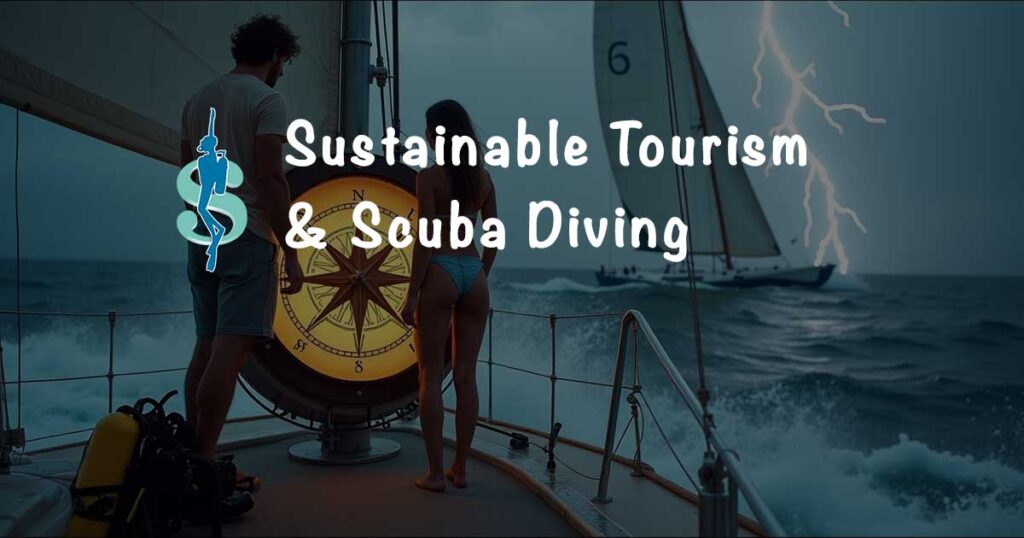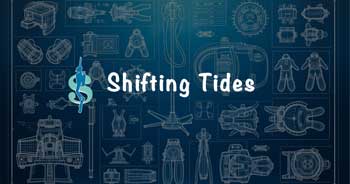Survey Results: Sustainable Tourism & Scuba Diving
Understanding scuba divers & dive professionals’ relationship to the environment and commitment to sustainable tourism.
We conducted a survey on sustainability in the dive industry in preparation for Dr. Alex Brylske’s post, “The Challenge for the Technical Diving Community? Connecting Divers With the Environment” in InDEPTH Magazine.
InDepth Magazine and the Business of Diving Institute collaborate on a series of scuba diving industry surveys to better understand where we stand on dive industry issues, identify workable solutions, increase awareness of opportunities, and, most notably, fuel discussions among dive professionals.
We thank the following scuba diving industry leaders for directly supporting this initiative: Shearwater, DAN Europe, and GUE. We also thank all of you who took part in these surveys and studies.
This post is part of our Dive Industry Compass series by the Business of Diving Institute and Darcy Kieran, author of:
Contents on This Page
TL;DR Overview
This survey highlights a significant gap in environmental education within the scuba diving industry, despite overwhelming interest from both customers and dive professionals.
The majority of dive professionals (86.7%) deem the understanding of aquatic environments and ecology important or very important, a sentiment shared by nearly 80% of scuba divers.
However, the initial training system appears insufficient, as only 15.6% of professionals and 22.9% of divers felt well-prepared by their courses to understand the diving environment. This gap is further evidenced by the finding that only 18.8% of divers reported their entry-level instructor demonstrating high interest in the environment, suggesting a potential curriculum mismatch or a failure by instructors to effectively communicate their own commitment (which 82.2% of professionals claim). This lack of formal training means that professionals primarily compensate by being “self-taught” (64.5%).
For instructors and dive shop owners, these findings represent a clear market demand for new educational offerings. Dive professionals are actively seeking more environmental knowledge, primarily wanting this content from their training agencies (72.7%).
They highly prefer to consume this information in accessible digital formats, specifically online courses (81.8%) and webinars (81.8%).
The most desired topics for deeper understanding are pollution/eutrophication (73.3%) and climate change (60.0%).
Furthermore, dive professionals feel strongly that their employing dive businesses (44.4% rated committed or very committed) and training agencies (38.6%) are significantly less committed to environmental issues than they are personally, indicating an industry expectation for greater leadership and investment in sustainability and conservation education.
How important is the understanding of aquatic environments & ecology of the locations we frequent as scuba divers?
- 86.7% of dive professionals judged this to be important or very important.
- 79.2% of scuba divers said the same.
In both groups, most survey respondents judged this to be quite important. It makes sense that the issue is even more important to dive professionals since their livelihood depends on it.
- 60.0% of dive professionals believed that topic to be important or very important to their scuba diving clients.
Based on these figures, it is possible that dive professionals underestimate their clients’ interest in the environment.
How well are we prepared?
- Only 15.6% of dive professionals reported that their scuba training courses had prepared them very well or well for aquatic environments.
- Only 22.9% of scuba divers said they had been well or very well prepared to understand the environment in which they were to dive.
So far, this survey shows that a majority of scuba divers, at all levels, believe the environment to be significantly important, although they were not well prepared.
How are we training new scuba divers?
- Only 18.8% of scuba divers reported that the dive instructor in their initial entry-level scuba diving certification course showed interest in or was very interested in the environment.
There seems to be a huge disconnect here. Dive professionals are extremely attentive to the environment, but they do not seem to communicate this effectively to their student divers.
It could be inferred that the curriculum provided by dive training agencies may not be a good fit.
Are we committed to sustainability in scuba diving?
- 82.2% of dive professionals surveyed claimed to be committed or very committed to the environment.
- 68.8% of scuba divers said the same.
Again, I would expect dive professionals to be even more committed than scuba divers since their business and career depend on it.
In comparison, dive professionals believe that other entities in the dive industry are less committed than they are:
- 44.4% of dive professionals surveyed rated the dive business for which they work as committed or very committed.
- 38.6% of dive professionals surveyed rated their dive training agency as committed or very committed.
- 20.0% of dive professionals surveyed rated the dive industry in general as committed or very committed.
It appears dive professionals feel like dive businesses are not doing enough on that front.
How well do we understand the aquatic environments & ecology of the underwater locations we dive in?
Although both scuba divers and dive professionals harshly judged how their scuba diving courses prepared them to understand the environment, both groups seem to believe their current knowledge to be fairly good.
- 77.8% of dive professionals reported that their knowledge of the environment was good or better than good.
- 68.8% of scuba divers said the same.
I find these numbers surprising. In my experience, a majority of divers jump into the water without knowing much about the marine life they will encounter or the ecological issues affecting the habitat they are diving in.
Where did dive professionals get their knowledge of the environment?
- 64.5% of dive professionals listed “self-taught” as a major source of knowledge of the environment.
This answers the question we had earlier. Scuba diving courses do not provide us with a proper level of knowledge about the environment, either at the scuba diver or professional levels, but we compensate by learning it ourselves.
Other sources of environmental and ecological knowledge for dive professionals are:
- 57.8% books
- 46.7% fellow dive professionals
- 44.4% online content
- 35.6% news
We should not underestimate our role in helping other dive professionals improve their knowledge of the environment.
Where would dive professionals like to get more knowledge of the environment?
Dive training agencies are under the spotlight!
Here’s where scuba diving professionals would like to get more knowledge of the environment:
- 72.7% dive training agency
- 36.4% InDepth magazine / Scubanomics
- 27.3% instructor trainer (course director)
- 18.2% DEMA/DEMA Show
It’s interesting! This could explain why one of the largest dive training agencies has recently boosted its communications about the ocean and the environment.
However, personally, I believe we shouldn’t rely too much on dive training agencies. Their focus is on selling more c-cards. Our focus is on spending quality time underwater with people.
How do dive professionals want to get more information on the environment?
- 81.8% online courses
- 81.8% webinars
- 56.8% books
The first two results are not surprising. But 61% of dive professionals would still like traditional books.
What main environmental topics do dive professionals want to understand better?
- 73.3% pollution/eutrophication
- 60.0% climate change
- 57.8% fish identification
- 51.1% coral identification
- 44.4% tropical ecosystems
- 42.2% freshwater ecosystems
- 40.0% dangerous marine life identification
- 35.6% sharks
What main environmental topics do scuba divers want to understand better?
- 64.6% pollution/eutrophication
- 52.1% tropical ecosystems
- 47.9% climate change
- 41.9% fish identification
- 41.5% coral identification
- 39.6% freshwater ecosystems
- 37.5% ocean acidification
- 35.4% dangerous marine life identification
Video Summary & Thoughts
Who answered the sustainability vs. scuba diving survey?
We had 818 respondents split almost equally between scuba divers (48.3%) and dive professionals (51.7%).
39.1% of participants were residents of Europe, and 32.6% from the USA.
9.8% of respondents had been certified for less than 5 years, 18.5% between 5 and 10 years ago, and 71.7% had been scuba diving for over 10 years.
Have a look at more scuba diving market research, surveys, reports & statistics in Your Dive Industry Compass.
If the information in this post was valuable to you, would you consider buying me a coffee?
Either way, please help the dive industry by taking part in ongoing surveys. Results from our past scuba diving market studies are also available here.
Your Dive Industry Compass
Scuba Diving Market Research, Surveys, Reports & Statistics
Shifting Tides
Strategies for Today’s Scuba Divers
Living The Scuba Dream
Plan Your Scuba Instructor Career & Deep Dive the Plan
You may also be interested in The Immersion Zone (our podcast), Scubanomics (our newsletter for dive professionals), and our published books & reference guides.





